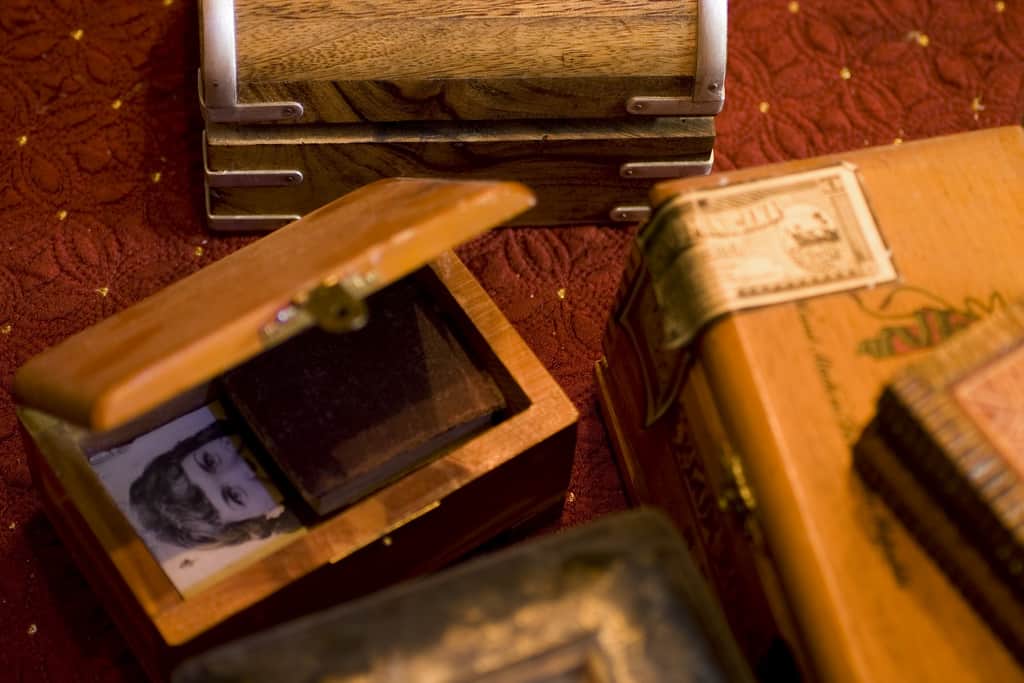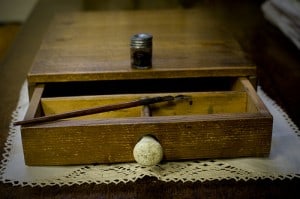We have a rattly old rocking chair in my parents’ house. It’s dark in color, dinged with age. The wicker is loose and dry and broken in places. It’s not an ordinary rocking chair, but a small, frail thing, big enough for a small child, or maybe a doll. I fear if a small child tried to sit in it it would crumble beneath the slight weight. At Christmastime my mom sets a stuffed doll of a napping Santa in it (a small accompanying sign reads “December 26”), the rest of the year is just sits in a corner of the living room, silent and empty.
The chair was my grandpa’s. He grew up on a pecan farm in San Saba, Texas. He joined the Navy in World War II and served on Midway as an aircraft mechanic before being sent to California. It’s here that he met my grandma, one of the Navy WAVES. Their first date was to a movie. When they married grandpa wore his Navy uniform, and they moved to Oregon (where my mom was born) before settling in the suburbs of Los Angeles. They raised two daughters, and my grandpa was head of the facilities department at CalTech for 35 years. He was Grand Master of his Masonic Lodge. He took us grandkids for ice cream in his red VW bus. Of all the things my grandpa must have had through those years, this tiny, tired, child’s chair is the only thing from his bachelorhood – from his own youth in San Saba, Texas – that still exists (well, that, and a few Navy publicity photos of a handsome young sailor working in the Pacific).
Writing in Seattle’s The Stranger, Rebecca Brown wonders: why do the relics of the dead mean so much to us? She got to thinking about relics and the things we keep after visiting a travelling exhibit that featured the writing desk of St. Therese of Lisieux. I have to admit, Catholic-that-I-am, priesthood-in-the-future-as-it-is, I do not naturally connect with the Catholic piety around relics. It strikes me as strange that we venerate the bits of bone or body parts of dead saints as we do. And, honestly, keeping the body parts of the dead? Well, it just sort of creeps me out. But Brown got me to check my natural reaction for a moment, especially when she gets at the heart of why relics are meaningful to many people, not just pious Catholics:
Catholics aren’t the only ones with relics. Buddhists have a relic of Buddha’s tooth. Mary Shelley kept the heart of her dead husband, Percy, wrapped up in a napkin in her house. The EMP [Seattle’s Experience Music Project] has stuff of Hendrix, Cobain, rock stars. It’s as much of a reliquarium as any cemetery or church.
I have my mother’s ashes and my father’s cigarette lighter. My wife wears a scarf my dead best friend used to wear. I wear a T-shirt of the husband of a widowed friend who gave it to me and asked me to. I still have a bunch of my long-dead friend Joe’s books.
We keep these material things because they represent the people we no longer have. We keep them to remind us we can do or be or mean something and that the people we admire can inspire us.
And that’s about it, isn’t it? That old, ugly, worn out rocking chair, it’s not a chair, really. It’s a record of a time and a generation that grew up poor, that survived the Depression by growing pecans, that left home and went to war in strange, hot, lonely islands, that married a pretty girl and raised a family and worked in the same place for 35 years and retired, that lived an honest, prosperous life that I’m still reaping the privileges from. That old chair sits empty, but it’s full of meaning. It’s more than just a carrier of memories. When I see that chair, when I touch it, there’s a realization that happens; my grandpa is alive and present in the loose and broken wicker. That chair means something–history and memories, yes–but also the reality of who I am today because of that person who lived.
******
The writing desk of St. Therese courtesy Catholic Church England and Wales



